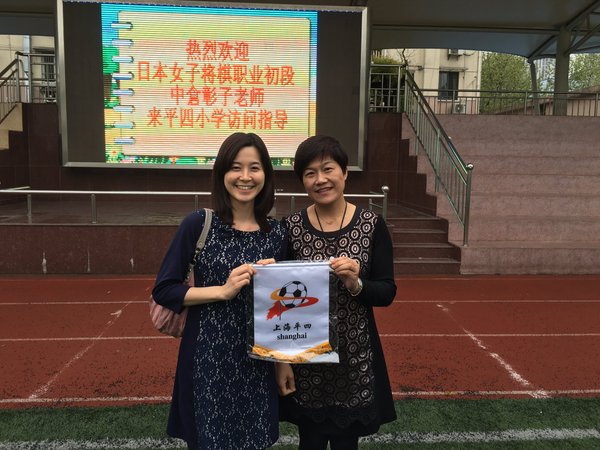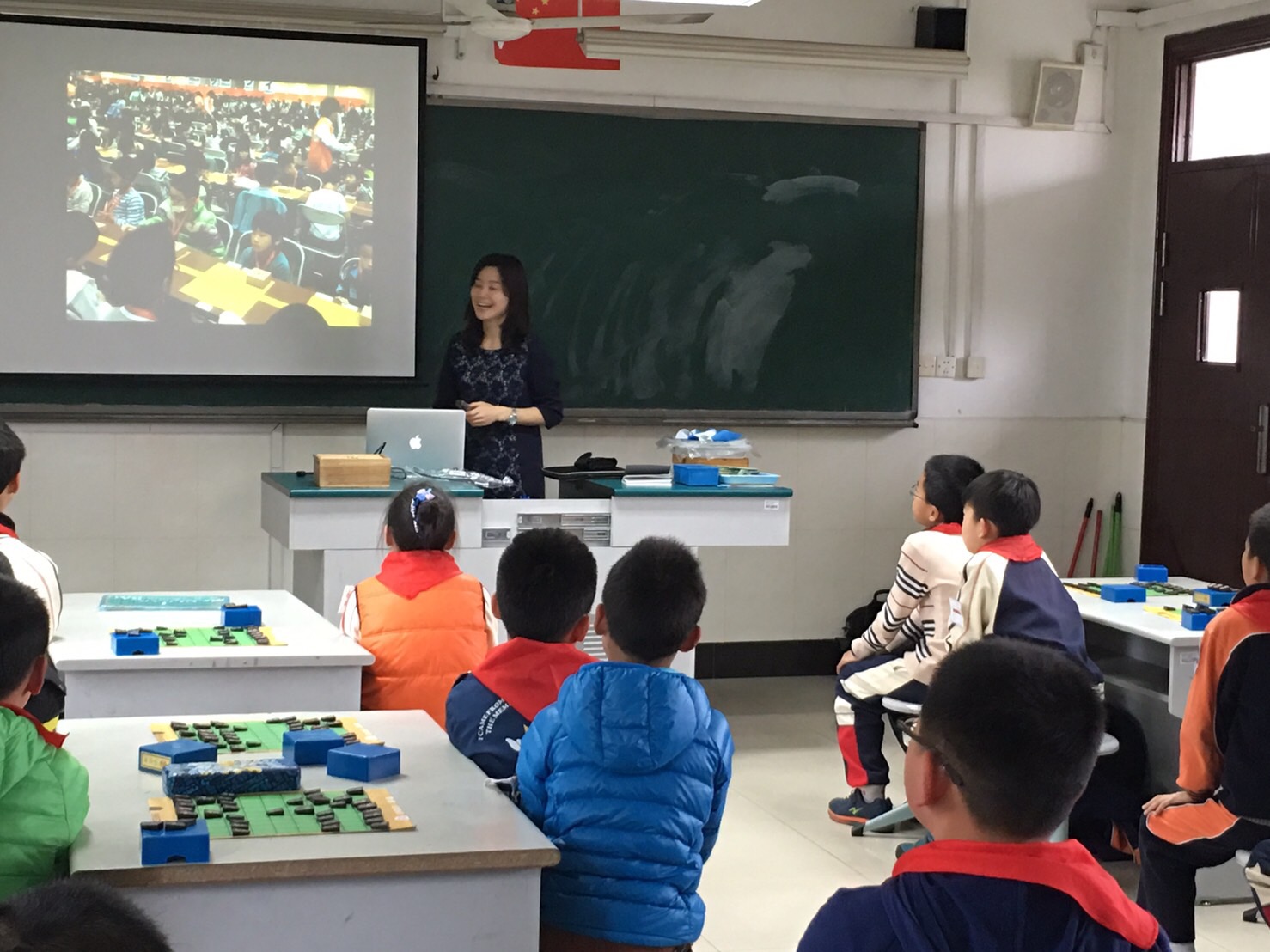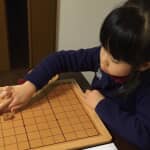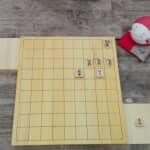Shogi 19 December 2016
Shogi’s Popularity in China
So Different from Japan! In Shanghai, Japanese “Shogi” Is Categorized into “Physical Education”!
I visited “Xu Jiandong Shogi Club” in Shanghai.
By the way, did you know that Japanese Shogi had been introduced into the elementary school curricu-lum in Shanghai? More surprisingly, Shogi has been taught in gym class out there!
I heard that Japanese Shogi was regarded as one subject in the category of “Mind sports” in China side by side with Chinese chess, Xiangqi and Go.
(In Japan, mostly Shogi is not included into the school curriculum, nor is it regarded as one of sports.)
I can tell how much exhausted I am after each Shogi game. During a game, physical activities aren’t re-quired, but a lot of psychological activities are done in our brains. It’s difficult to say visibly, but after the game Shogi players more often than not are exhausted mentally and physically.

You will find equipment for Xiangqi displayed at the sports goods corner in sporting goods stores or sta-tionery stores, not in toy stores. (In Japan, might be in toy stores.)
Isn’t it peculiar that Xiangqi-goods are displayed next to badminton rackets and Rubik’s Cube?
The reactions of parents in Shanghai to Japanese Shogi are very positive, since practicing Japanese Shogi noticeably helps to develop children’s abilities in several ways; to behave in a well-mannered way, to think logically, and to concentrate. The number of school principals who consider introduction of Shogi into their school curricula has been increasing. Up to now, 220 schools have introduced Shogi as one of their classes.
Mr. Xu Jiandong, a founder of “Xu Jiandong Shogi Club”, has been committed to the growth of Shogi among elementary schools in Shanghai over 30 years.

After 20 Years of Persevering, Mr. Xu Jiandong Made, Japanese Shogi Finally Gain Popularity in Shang-hai.
I interviewed with Mr. Xu Jiandong about the growth of Japanese Shogi in Shanghai.
Akiko Nakakura (hereafter Akiko): What inspired you to take up Japanese Shogi?
Mr. Xu jiandong (hereafter Xu-san): When I worked in Japan, I learned Shogi from one of my friends. He was a very good Shogi player. I was eager to beat him and started to attend a Shogi practicing hall.
Akiko Nakakura: I heard you mastered Shogi in a short period, didn’t you?
Xu-san: I had been familiar with Chines chess, Xiangqi. Xiangqi and Japanese Shogi have many things in common. I suppose I already had a sound basis to play Shogi.

Akiko Nakakura: Why did you decide to promote Japanese Shogi in Shanghai?
Xu-san: I think that Shogi has something similar to interpersonal communication. Both Shogi and inter-personal communication are done between two persons (sometimes more than two). What if your partner doesn’t know how to play Shogi, while you know it? You will probably teach the rule of Shogi to play a game. Mutual communication will be established through Shogi. I believe Shogi can be spread around the world, as if English is used as an international common language.
Akiko Nakakura: I wonder if you had many difficulties to make Shogi acceptable among Shanghai society.
Xu-san: Yes, it was true. Within China, people were not ready to accept Japanese traditional culture 20 years ago. Only one school out of ten gave me a preferable reaction. It could be worse. During the first five years, I offered Shogi equipment, Shogi boards and pieces, as voluntary gifts to many schools, so that they would come to discover the real quality and appeal of Japanese Shogi. Actually, my words were not able to communicate my sincere desires of Japanese Shogi to people in Shanghai. It bothered me a lot. In addition, financial hardships bothered me as well.
Akiko Nakakura: How come you have maintained your desire of the growth of Shogi in Shanghai in spite of 20-year hardship?
Xu-san: My strong passion for Shogi has driven my life. I willingly accept full responsibilities for reputa-tions for Japanese Shogi in Shanghai. If Japanese Shogi failed to gain good reputations from Shang-hainese and was considered as worthless, I would be to blame for all.
Also, I often teach my students the importance of doing things continually. It may be easy for many peo-ple to continue Shogi for half a year or a year. But, it would be very difficult to keep Shogi practice for life. I’m convinced that continuation of Shogi practice will provide significant value to children, once they can overcome the obstacles in life, such as family matters or school matters.
As a teacher, I always advocate the importance of continuation, so I can’t allow myself to throw away my dream. In fact, I have achieved great results from devoting steady efforts to familiarize Shanghainese with Japanese Shogi. Specifically, my club ended up in the red seriously for the first five years, stopped the growth of the deficit in the next five years, and got out of the red into the black after the next five years. In the most recent five years, my club has generated profit.
Akiko Nakakura: What are some things you keep in your mind to introduce Japanese Shogi to Shanghai, where people live in different culture?
Xu-san: I usually try to make sure my presentation to each school is right on point according to the school’s needs. For example, when I work out with a school that centers on educational achievement, I emphasize good effects from Shogi to improve memory performances. On the other hand, with a school that seeks for some recreational programs, I stress the highlights of Shogi as a game. Like so, Shogi has various charming points.

Akiko Nakakura: I would love to know from where your passion for Japanese Shogi comes. Could you tell me about it?
Xu-san: Sure. Imagine, there are two children sitting across a Shogi board. Their conversation surely will start with something about Shogi. As time passes, they may change the direction of their conversation. “Possibilities are infinite.” By the time the game ends, they will build deep friendship. In another word, Shogi can be a trigger to strengthen the tie that brings people together. I have encountered many wonder-ful friends through Shogi. I do hope people in Shanghai also have wonderful opportunities to make many friends.
Postscript–after the Interview–
This interview was not the first time to talk with Mr. Xu Jiandong.
Last year, I went to Shanghai with my daughter to take part in the exchange with Japanese children and Chinese children. At that time Xu-san took care of my daughter and me. Moreover, he comes to Japan once a year with children from “Xu Jiandong Shogi Club” to conduct a Japan tour. During the tour I was given a chance to teach Shogi to children, I got his cheerful and innocent impressions from his way to treat children.
His impressions stay the same. And also I feel I discovered another his personality through this interview. That is his strictness toward Japanese Shogi.
I see his strictness in his style of grading students. When he evaluates students, he sets evaluation stand-ards not on “winning or losing.” His criteria are students’ attitudes toward Shogi: attending every class, setting Shogi pieces in the proper way, or making greetings politely before a game.

Currently, Shogi population in Shanghai, the number of people who have some experiences in playing Japanese Shogi, is approximately one million. Many children have gathered from all over Shanghai to learn Shogi at “Xu Jiandong Shogi Club”. Some of them commute for three hours each way to the club.
The current growth of Japanese Shogi in Shanghai, where Japanese Shogi was totally unknown to people in the past, is highly attributed to the heavy work done by Mr. Xu Jiandong and empathies of Shang-hainese for his work.

Information about Do-jo
| Name | Xu jiandong Shogi Club |
| Address | Room A 02, 19F Heng Tong Road 360, ZhaBei Qu, Shanghai China |
| Telephone | +86-21-6380-8512 |
If you are interested in learning Shogi, check out our articles on Shogi rules!




